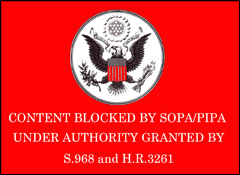The Pulse Archives
SOPA and PIPA remain mysteries for most
By Christopher Salinas | Pulse Staff Reporter

Censored | Photo: Fanpop
The Stop Online Piracy Act (SOPA) and PROTECT IP Act (PIPA) caused a huge uproar in January 2012, with Wikipedia and thousands of other sites blacking out for 24 hours to protest these bills in the U.S. Congress.
SOPA was introduced on Oct. 26, 2011, by U.S. Rep. Lamar S. Smith (R-Texas), while PIPA was introduced on May 12, 2011, by U.S. Sen. Patrick Leahy (D-Va.).
SOPA was aimed at foreign sites “committing or facilitating” copyright infringement, whereas PIPA was limited to sites with “no significant use other than” copyright infringement. Therefore, SOPA was seen as the more extreme of the two.
“Well, like most people, I wasn’t even aware of the bills until I saw links about it posted on Facebook. No surprise there,” said Guadalupe Gonzalez, a freshman Philosophy major. “I know very little about the bills, and I’m certain what I do know is not even accurate.”
This social network trend, along with about 7,000 websites blacking out on Jan. 18, publicized the bills. However, the publicity didn’t seem to properly inform people about the bills’ content. People were even unaware about who actually started this opposition.
“…People had thought that it was sites like Google and Youtube that started this (movement), but that’s not the case,” said Brent Walker, a Palo Alto College Communications graduate. “This movement was started by the common user.”
The Internet is used by many different people. But the biggest concerns came from young adults and teenagers, who are digital media natives. While the passing of these bills would prevent people from illegally downloading their favorite songs, people thought it would also censor the Internet and violate simple freedoms, such as a Google search for a website.
Media companies always tried to fight piracy, but they have problems dealing with oversea websites, such as “The Pirate Bay” and “MegaUpload,” because no action can be taken against them for infringing on U.S. copyrights, which is where SOPA and PIPA come into play.
One of the original methods these bills contained was an ISP-blocking provision, which meant the U.S. Department of Justice could seek court orders to force an Internet service provider to prevent its customers from being able to access a website, such as thepiratebay.org.
Another method these bills contained would have allowed rights holders to request that infringing sites’ funding be cut off. This would have removed any search links to that site.
Supporters of these bills argued that the Internet isn’t regulated enough and that boundaries need to be set because of the rise in piracy.
Gregory Pasztor, a Communications Instructor, said the strongest support came from the music and movie industry because of the amount of money they are losing as a result of piracy.
“One credible study by the Institute for Policy pegs the ANNUAL harm at $12.5 billion dollars in losses to the U.S. economy as well as more than 70,000 lost jobs and $2 billion in lost wages to American workers,” according to the Recording Industry Association of America website.
The people who oppose these bills didn’t have a problem with trying to prevent piracy; it was a problem with the bills themselves. Opponents believed that the bills didn’t do enough to prevent false accusations because they granted immunity to payment processors and ad networks that accused another site of infringement. Many also thought that big companies would use these loopholes to shut down less powerful companies and their websites.
As a result of the website blackouts and Google helping to raise awareness, these bills were seen in a negative light by the general public. They received such negative feedback that both bills were temporarily postponed on Jan. 20. No date has been set for when these bills are expected to return.
Congress is currently trying to rewrite the bills to make them more acceptable, which means we will be seeing them again. For more information and to voice your opinion, contact your representatives. Go to votesmart.org and type in your zip code to see who they are. You may also visit the Library of Congress website at loc.gov to search for more details on SOPA and PIPA.
March 2012
- Father, mother, sister, brother attend Palo Alto
- Palo Alto recognizes teaching excellence
- Construction projects receive mixed feedback
- SOPA and PIPA remain mysteries for most
- Student veterans organization provides support
- Bikeshare program cruises into Palo Alto
- Another green year at Palo Alto
- To e-book or not to e-book?
- Palo Alto, the college for you
- Ten tips for successful learning
- Healthy steps for a balanced life
- How to write a resume the right way
- Why graduate and not just transfer?
- Sweet Anticipation: Spring Break 2012